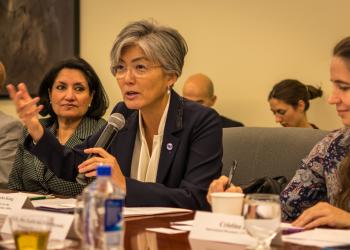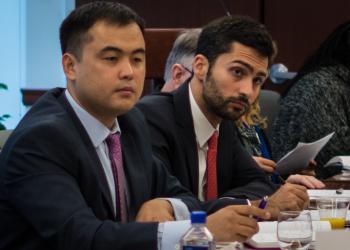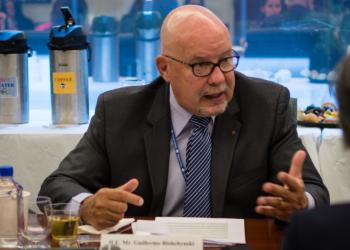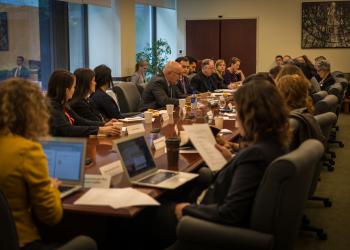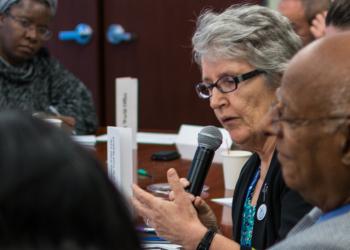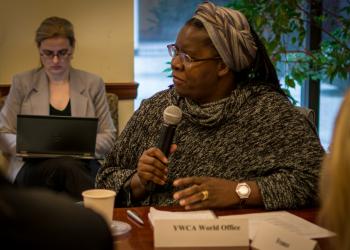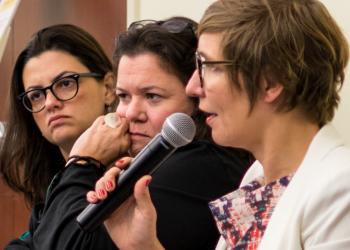Links explored between sustainable development and global humanitarian crisis
Buffeted by protracted conflicts in the Middle East and elsewhere, and the rising magnitude of natural disasters, the world has been hit by a series of humanitarian crises on a scale not seen in decades.
By the UN’s count, more than 100 million people around the globe depend on humanitarian actors for life-saving assistance and protection – a figure that is double what it was ten years ago.
The question that arises is this: how does the growing humanitarian crisis affect the implementation of the Sustainable Development Goals (SDGs), which were adopted by the UN this month, and vice versa?
That was the theme of an informal breakfast meeting held 22 September 2015 at the offices of the Baha’i International Community, which was the 28th such gathering in a series designed to bring together diplomats, UN officials, and civil society representatives to discuss the post-2015 development agenda.
Guillermo Rishchynski, permanent representative of the Mission of Canada to the United Nations, said the connections between the current succession of humanitarian crises and development was one reason diplomats were able to agree on the SDGs, which have 17 overall goals and 169 targets.
“I think it is the sense of urgency that exists in so many quarters around our planet, understanding that if we don’t come together to act, the situation of vulnerability for so many populations [stems from] the situation of disasters ... caused by conflict and environmental degradation,” said Ambassador Rishchynski, one of two keynote speakers.
The SDGs, he said, seek to address the root causes of these disasters, whether natural or man-made, noting that the humanitarian crises are driven by “a combination of factors” such as “people leaving where they are to seek economic opportunity,” “people leaving where they are because the environment can no longer sustain the way of life that they had,” and “people leaving a particular area because they are overwhelmed by the impact of conflict on them and they want better lives for themselves and their children.”
Those things, he said, are actually at the core of the sustainable development agenda, which puts the world on a “new footing” to address the underlying issues.
Kyung-wha Kang, assistant secretary general for humanitarian affairs and emergency relief coordination at the UN Office for the Coordination of Humanitarian Affairs, said the upcoming World Humanitarian Summit, scheduled for May 2016, can be seen as the next in the series of global conferences and events that bolster and define the sustainable development agenda.
The Summit, she said, “aspires to bring all stakeholders to the table, governments, UN humanitarian agency, NGO partners both international and national, new partners in humanitarian enterprise, private sector, lots of new players in the Middle East, Islamic financers, and, most importantly, the affected communities themselves.”
One goal of the Summit, she said, will be to link the humanitarian agenda with the development agenda.
“Our appeal to the developmental sector is that they have to come in more quickly and link up with the humanitarian intervention [sector] so as to make that transition seamless, and in support of enabling people to grow out of their chronic vulnerabilities,” she said.
This link up is critical, she said, because the new crises seem longer lasting than in the past.
“Protracted is the new normal,” she said. “Humanitarian tools are just not designed for these protracted situations. Humanitarian tools are designed for time-bound, quick, impact. But we find it is the same humanitarian appeals over and over again, year after year, many of these protracted situations.”
In the discussion that followed, the issue of trying to address the root causes of humanitarian crises was a common theme.
Serik Tokbolat, a representative of the Baha’i International Community to the United Nations said: “We should not only be firefighters but proactive agents.”
Mr. Tokbolat also suggested that any approach to address the humanitarian crises afflicting the world should not neglect the power, capacity and resilience of local communities themselves to face humanitarian challenges. Government and agencies should work with or facilitate the actions of local communities, he said, adding: “They know their culture and reality.”
As with previous discussions, the opening comments were followed by a general, off-the-record discussion among participants. The event was co-sponsored by International Movement ATD Fourth World, in collaboration with the Baha’i International Community.
Notes of the meeting can be read here.
